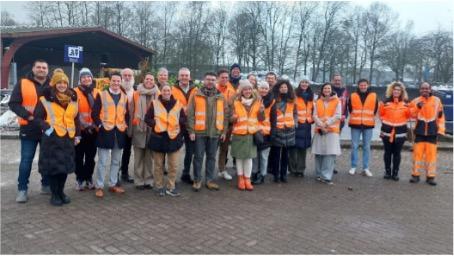Study visit to Apeldoorn to Explore Sustainable Solutions
A delegation from the CLEAR CITIES project visited Apeldoorn, Netherlands, to explore innovative urban solutions to improve waste management from 11 to 13th of February.
Day 1:Sharing Experiences
The event took place at the CODA Museum and was inaugurated by Alderman Mr. Danny Huizer, who welcomed the participants on behalf of the city council of Apeldoorn.
Mr. Huizer highlighted Apeldoorn’s commitment to sustainability, describing it as the green capital of the Veluwe area. He emphasized the city’s efforts to become as circular as possible, ensuring that resources are used efficiently and responsibly.
Following the opening, Marisa Sebastián Ponce from EMULSA introduced the Clear Cities project, which is part of the Interreg Europe program, involving 36 countries across the European Union. The goal of the project is to improve policy instruments related to waste management through the exchange of experiences and knowledge. Participating regions aim to update their waste management policies by the end of the project in June 2028.
Several successful initiatives were presented during the event:
-
Piedmont Region (Italy): Marela Thani explained the "Pay-as-you-throw" system introduced in six municipalities, which promotes personalized waste collection and encourages citizens to separate waste more efficiently.
-
Gijón (Spain): Sergio de Lucas presented the "Pay and Know as You Throw" pilot program, which tests a new tax system based on waste separation and quantity. The project has shown positive results, with up to 80% of waste being properly separated.
-
Gothenburg (Sweden): Elina Jarkil highlighted the city’s communication campaigns to reduce waste, including the “All Against Avoidable Food Waste” and “Shower to Hit” initiatives, which have successfully engaged the public.
-
Apeldoorn (Netherlands): Bert de Leeuw introduced the city’s innovative diaper collection and recycling project. Apeldoorn has set up separate collection points and launched a program to encourage the use of reusable cloth diapers.
-
Burgas (Bulgaria): Maria Burulyanova presented the mobile waste collection centers, which allow citizens to separate waste easily in different locations. The program has been expanded to 19 centers across the city.
-
Ljubljana (Slovenia): Maja Rijavec shared the work of SMETUMET, a social enterprise that creates products from waste materials, contributing to the circular economy.
-
Bucharest-Ilfov Region (Romania): Matei Smădu introduced the Trifoi Fest, an annual event promoting sustainable consumption and waste reduction through eco-friendly practices.
During the afternoon, participants learned about waste management challenges and solutions in Apeldoorn.
They attended a session by Petra Bennink on waste management in Apeldoorn, highlighting issues like population growth, limited space for waste containers, and illegal dumping. Solutions include becoming a zero-emission zone by 2030, greening projects, and the Cruise2Reduce educational program.
They then visited the Cruise2Reduce minibus, where Maud Tӧnis demonstrated how plastic waste is recycled into products like pots and tablet holders. A recycled plastic mask was made and gifted to Matei for his birthday.
Finally, participants took a city walk guided by Richard Buitenhuis and Petra Bennink to see waste management solutions in action, including pay-as-you-throw systems, bio-waste disposal, and donation rings for bottles and cans.
During the second day, participants explored Apeldoorn's recycling and circular economy efforts.
The day started at Circulus with a welcome from Director Lisette Bosch. Participants learned about Circulus’ recycling strategy from Bram Damen, including the goal to reach 65% recycling by 2035 through financial incentives and service improvements.
Reinier Hoppenbrouwers presented the plan to achieve a zero-emission fleet by 2030 using renewable fuels and electric trucks. At the Circular Craft Centre (CCC), Maritta Haantjes explained how recycling, repair, and social employment are combined to promote circularity and inclusion.
Esther van der Pol discussed dynamic route planning, which uses real-time fill level data to improve waste collection efficiency.
Participants toured the Recycle Area and observed the cooperation between Circulus and Foenix, where items are donated before being processed as waste. They also visited the problematic container park at Vlijtseweg and learned about past and ongoing efforts to reduce illegal dumping.
The visit ended at Foenix’s repair and thrift shop, where participants saw circular initiatives in action and picked up second-hand souvenirs.
During the third day, the focus was on the project’s internal organization.
The day was reserved for project partners and included sessions on project monitoring and the Steering Committee meeting, where representatives from all partner organizations participated to assess progress and discuss future steps.

